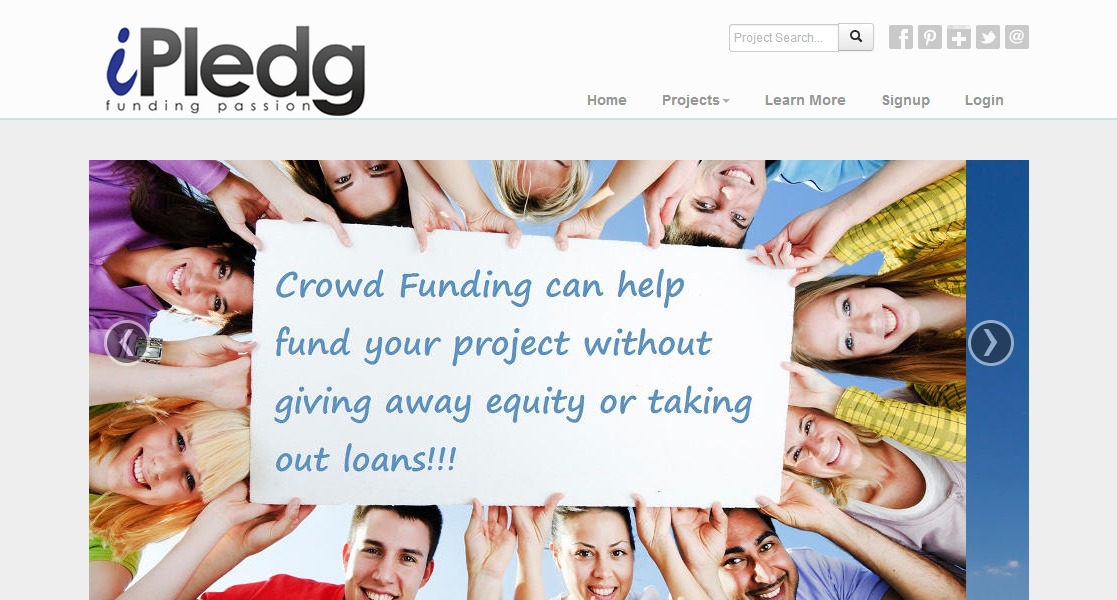
iPledg
Pitch your Startup, App or Hardware or post a Startup Event or Startup Job 
Andy Tompkins and Bryan Vadas are the founders of the iPledg.com Crowdfunding platform.
iPledg is serious about helping the Tech and Startup sectors get the seed funding they need. As a special offer to Startup88.com readers iPledg are wiping their fees for projects listed before December 31st 2013. Simply go to www.ipledg.com , sign up, login, create and submit your campaign then email us at [email protected] to ensure we wipe our fees for your campaign. Good Luck!!

The numbers are out, surprisingly only 24% of start-ups seek external funding from any source*. Of these, 57% are successful in securing the funds they request.
This means just over 13% of start-ups are successful in receiving external funding of any kind. Why is it so? And how do we overcome this hurdle to allow more start-ups to get the funding they need to launch, employ, innovate and develop? The answer may well lie in equity crowd funding.
The current Australian economic landscape is a patchwork made up almost completely of small business and start-ups. Despite a huge geographic footprint, Australia is home to just 24 million people. Between them, they are involved in the 2 million businesses currently operating. Of these, 96% are small business, those defined as having 0 – 19 employees. Small business in Australia accounts for just over half of all private sector employment, so their importance as an employer cannot be understated. Add to this the fact that at any time, over half a million people are involved in some form of early stage entrepreneurial activity, and you see that small business and start-ups are the foundation on which the entire economy is build.

The current misunderstanding is that start-ups are funded through the 3 Fs – Family, Friends, and Fans of the initiator. The truth is actually quite different, with entrepreneurs looking inward and providing the funding themselves, either from personal savings or personal credit card. Completing the list of the top four sources of funding currently used by start-ups, we find personally-secured bank loans, or cross subsidy from another business owned by the founder. In fact, of the top 20 sources of funding for start-ups, money from friends and other external investors rates only as number 11.
The ironic part of the whole situation is that the Reserve Bank of Australia claims that 80% of loan applications made by small business are accepted. In contrast, their figures point out that only a small fraction of small businesses are successful in securing venture capital funding.
The impact of the overall lack of success in small business and start-ups receiving the funding they need cannot be understated. The primary impact is on innovation, with 33% of early stage and start-up businesses claiming that the biggest obstacle to innovation is a lack of access to the funding they need to make it happen. Currently in Australia, the other options for equity fund raising are offers to the public (heavily governed and high cost to prepare and lodge a prospectus), angel investors (with whom start-ups have an average success rate of 1.4% in securing their required funding), and venture capital (which has funded an average of 25 companies per year over the past 10 years).
So the reason why start-ups don’t seek external funding is relatively clear – they believe there is a lack of options open to them. They recognise the slim chance of securing funding from VCs and angels, and the costs and high levels of governance around offers to the public makes them feel “why bother?”. In fact, 76% of start-ups that don’t even concern themselves with seeking external funding. The other major contributor to their lack of willingness to secure outside investment is a lack of education about what external funding will do for them, as many believe external funding means giving up control, something that is not palatable given their emotional investment in their innovation.
Enter Equity Crowd Funding. In Australia, the rules of the game have only just started to be drafted. Regardless of how the mechanics will finally be delivered to the market, equity crowd funding will simplify the access to capital for entrepreneurs and small business. Seeking funds will no longer involve having to bow down to grey-faced men and jumping the hurdles they set. Those seeking funding will soon have world wide access to investors through online campaigns. “Asking” will become much less daunting, as the innovator can approach their “first tier” (family, friends, and fans) to check out the campaign online, rather than going cap in hand and asking for a handout, thus making the whole process for less confronting. Engaging with the “second tier” or “friends of friends” also will become much simpler as the first tier is able to easily pass the campaign on to their networks by forwarding and endorsing a link. Once momentum is achieved, the word can more easily spread to a broader audience through online campaigning. The vast “third tier” or “smart money” can then jump on board and deliver the bulk of the funding, and it is access to this tier that innovators would traditionally never have access to without equity crowd funding.
With the pending introduction of Equity Crowd Funding, seeking funds will become much simpler. First followers will then be able to spread the word to their networks of what they have done by way of their investment, and then campaigns will have a greater chance to go viral and have global reach through the use of social media and the internet. Whilst equity crowd funding is largely unavailable (or, at least, highly regulated) in Australia, the initial noises are being made to hopefully make broad based equity crowd funding permissible in the not too distant future, making it far easier for start-ups to ask for (and to secure) the funding that they so desperately need.
Pitch your Startup, App or Hardware or post a Startup Event or Startup Job
